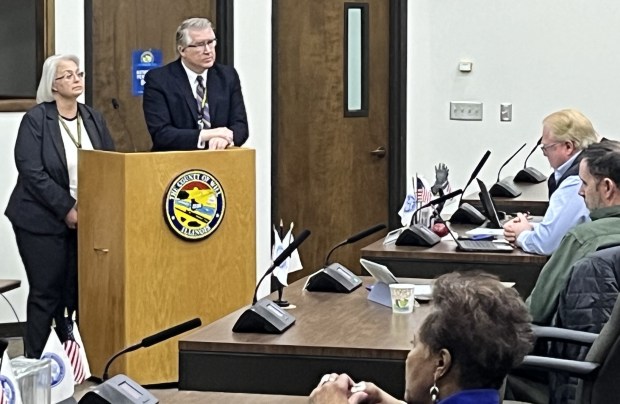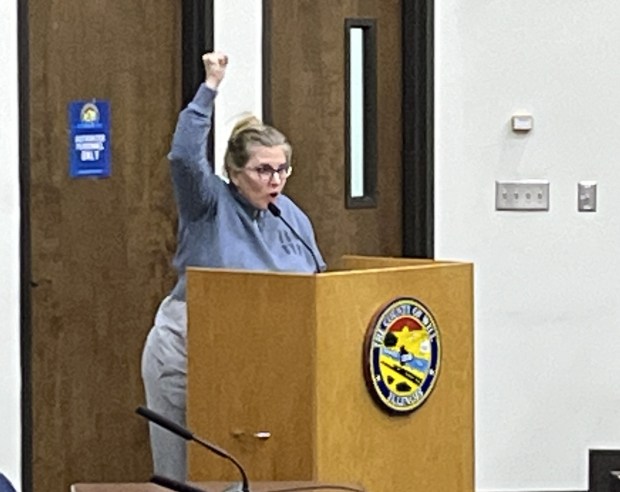The Will County Board failed Thursday to override County Executive Jennifer Bertino-Tarrant’s veto of the board’s action that stopped a road widening project through Homer Glen.
The county board voted 12-9 Feb. 15 to stop the planned widening of 143rd Street from State Street/Lemont Road to Bell Road, which would expand the road from two to five lanes. The board urged the county to consider a three-lane option.
Bertino-Tarrant inadvertently signed the resolution Feb. 16, recognized her mistake and then issued a veto the following day. In that veto message, she said the county board has supported the expansion in multiple votes since 2009, and the county already spent $6.2 million on the project. The county board’s resolution halting the widening project does not provide a solution to safety and traffic challenges, she said.
Earlier this month, the county board called a special meeting to address 143rd Street, which was canceled after not enough board members attended.
At the time, the executive’s office said they believed the veto had been upheld because a county board meeting was called, but representatives from the state’s attorney’s office disagreed and allowed Thursday’s vote to occur.
Overriding the executive’s veto required 14 votes. However, only 10 board members, eight Republicans and two Democrats, voted to override the veto.
Some board members said because Bertino-Tarrant signed the resolution that stopped the widening project, she couldn’t exercise her veto power.
“For the sanctity of what we do here, once a decision is made we can’t go back,” board member Dan Butler, a Republican from Frankfort, said.
Board Chair Judy Ogalla, a Republican from Monee, said the issue goes beyond the widening of 143rd Street in Homer Glen.
“This is about every single resolution passed by the county board,” Ogalla said.
Ogalla said the board needs its own attorney to represent them because having the Will County state’s attorney’s office represent the executive’s office, the clerk’s office and the county board is a conflict of interest. The board’s executive committee, chaired by Ogalla, voted last week to hire its own legal counsel against the advice of the state’s attorney’s office.
A bill is under consideration in Springfield that would allow county boards throughout the state to be able to hire their own legal counsel, Ogalla said.

Assistant State’s Attorney Mary Tatroe said there is not a legal conflict, but rather a disagreement, which frustrated some county board members.
Republican Leader Steve Balich of Homer Glen said the case needs to go to court for a judge to decide whether the veto can stand.
Ogalla said the process the county uses to complete road projects needs to be revamped because projects can last years, and the community doesn’t always have knowledge of what is happening.
“It’s not fair to the public,” she said.
Jeff Ronaldson, the county’s transportation director, said the county will continue with negotiations to obtain rights of way from area property owners. The county wants to widen 143rd Street to improve safety and traffic flow. Several segments of 143rd Street have been widened to five lanes since 2008, and this project would match those sections.

A recent traffic study showed more than 14,200 vehicles pass through that stretch per day, which exceeds the minimum threshold for building multilane roads. In 1990, there were about 5,600 vehicles per day.
Residents living near the route, however, said the project would take portions of their land, disrupt the rural character and cause more traffic, noise and pollution.
Resident Scott Perry said residents who appreciate nature moved to Homer Glen.
“They got tired of the concrete. They got tired of the strip malls,” he said. “They moved to Homer Glen for the trees and the nature. … If we keep doing this, the community loses what makes it unique.”
Michelle Mullins is a freelance reporter for the Daily Southtown.
Michelle Mullins , 2024-03-21 19:05:37
Source link


